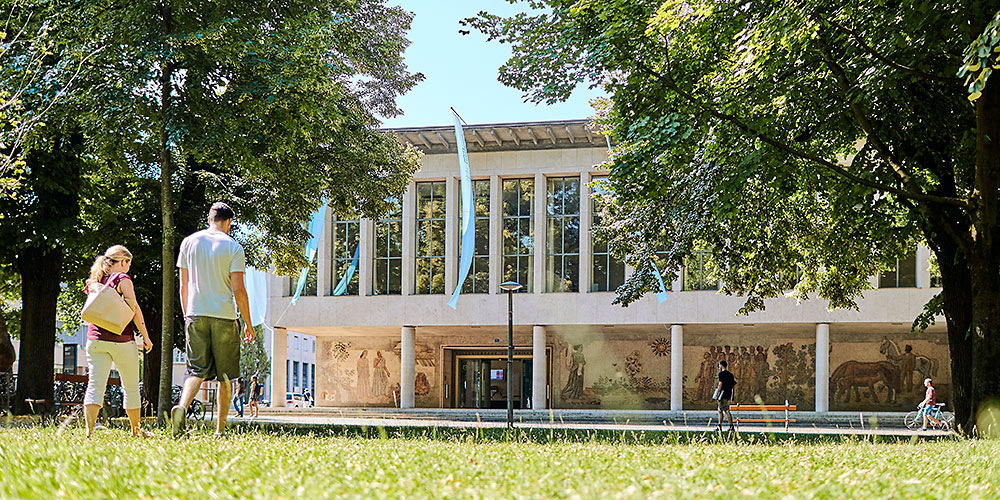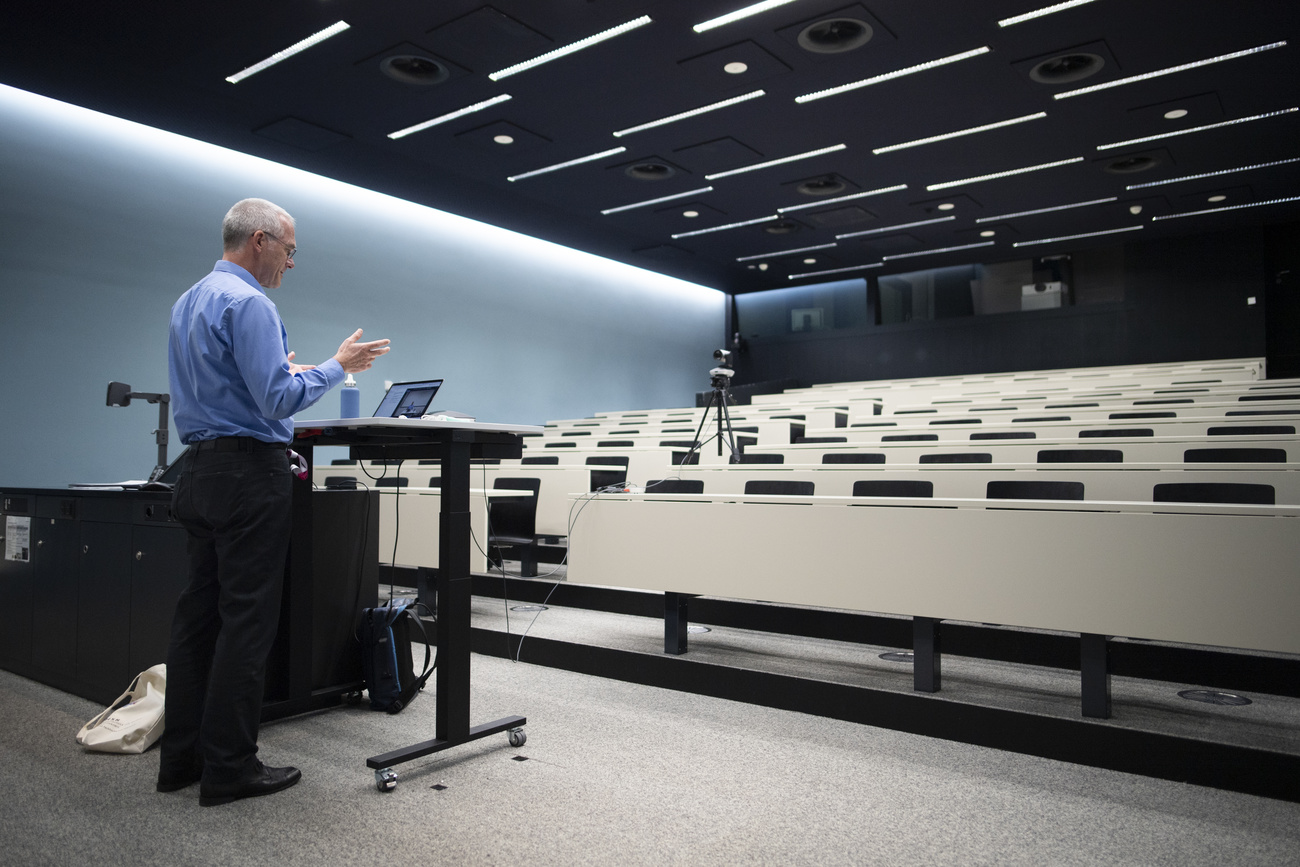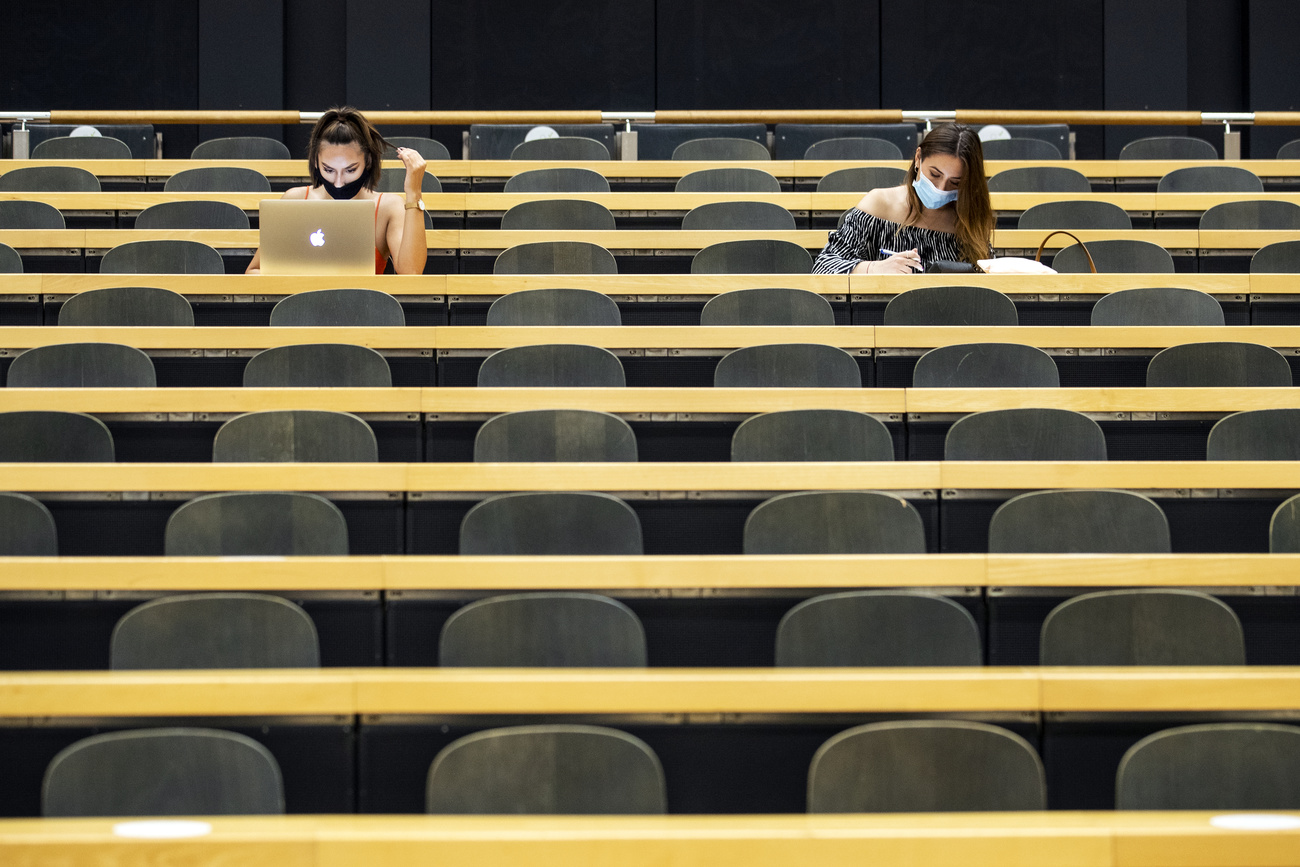How Covid-19 has boosted digital learning in universities

Students in Switzerland have been returning to campus this semester, following two years of disruption due to the coronavirus pandemic. But online learning still has its place.
There was sense of a return to normality for the more than 12,000 students starting the autumn semester at the University of Basel in mid-September this year. Gone were the masks, social distancing and showing a Covid certificate (as proof of vaccination or testing) of previous years. Lecture halls were full, the cafeterias too. Social lives were back on.
With Covid-19 measures behind them, many students relished being back at university. But not all signs of the pandemic have disappeared on campus. Forms of online learning, which marked Swiss university life for long periods during the height of the pandemic – and involved a sudden change to learning for both lecturers and students – have imposed themselves in most universities across the country.

“The number of purely online courses in the autumn semester is 22 – this corresponds to about 1% of all courses,” Matthias Geering, spokesman for the University of Basel, told SWI swissinfo.ch via email. For comparison, there was just one course online pre-pandemic, in 2019.
‘Blended learning’
“Where it makes didactic sense, digital learning will continue to be offered,” Geering said. But not as distance learning – so purely following lectures via Zoom or Teams – but as blended learning in the ‘Flipped Classroom’ format. This is made up of knowledge acquisition online via, for example, videos and lecture recordings, and then consolidation, application and reflection in groups on campus, Geering explained. In this way the university can combine “the best of both worlds”.
The move has been spurred on by the pandemic. A survey of digital teachingExternal link at the university published in March 2021 – a year after teaching went digital – also found that most students and lecturers valued the increased flexibility of digital formats.
Nevertheless, it is important for students and lecturers to interact on campus, Geering said – something that has also become clearer through the pandemic.
The Swiss government lifted all coronavirus measures as of April 1, 2022, but many universities continued with some restrictions until the summer.
Before that there had been two shutdowns (spring 2020 and autumn 2021) with distance learning. Between this there was on-site teaching under restrictions (masks, distancing, Covid certificate).
It is a similar story in other Swiss universities: the University of Bern hasExternal link, for example, recommended that non-interactive lectures be recorded as podcasts. The University of Geneva is working on automatic recordings of lectures in rooms equipped for this from 2023-2024. “Recorded courses are a supplement for students to use in addition to presence teaching; they are not distance learning as such,” the university said. And while the university supports real distance learning, this needed to integrate the right “pedagogical vision”.
Fixed day
The Schwyz University of Teacher Education has gone a step furtherExternal link. This autumn it introduced one set day a week of online learning at Bachelor level.
Spokesperson Ulrike Seifart said that the move, which will be assessed in June 2023, was aimed at “implementing our positive experiences in distance learning [acquired] during the pandemic”. Some course content was well suited to being taught digitally, she explained.
Many students also appreciated the increased flexibility, for example to combine studies with family, job or elite sporting duties, she added.
As far as Seifart knows, the Schwyz University of Teacher Education is the only university of teacher education in Switzerland to have one set online day.
However, the institution still wants students to come to campus, as interaction is important. “Teaching is and remains a social profession, and you can’t build social skills digitally. Likewise, there is training content that cannot be taught digitally,” Seifart said.
Students happy
As for the students, they are generally happy about the return to campus life, Seraina Campell, co-president of the Swiss Student Union, told SWI swissinfo.ch.
“In our view, a return to pure distance learning is out of the question. Social exchanges suffered [during the pandemic], the mental strain was very high and it was difficult, especially for first-year students, to find a connection to everyday university life,” she said via email.

More
Covid takes its toll on mental health of students
But students still appreciate having certain lectures or other formats online or being able to listen to them again later.
“Most students work alongside their studies, some have to take on care responsibilities or are not able, for health reasons, to go to the university every day and do everything on site,” Campell said.
The future
Swiss neighbours GermanyExternal link and FranceExternal link have also gone back to in-person university teaching. There are signs that digital learning has marked students there too. A surveyExternal link of students Germany, published in January this year, found that four out of five students would like a mixture of on-site and online teaching in the long term.
An American study, highlighted in the New York Times in OctoberExternal link, has suggested that online higher education may actually work better than pre-pandemic research expected – and that it is evolving “decisively” towards blended learning.
“I don’t think we can imagine teaching at universities without digital formats,” the Swiss Student Union’s Campell commented. For her, it is important that students are involved in the next developments concerning digital learning and that their needs are considered.
Overall, she said, it “remains to be seen how the different possibilities will work in the future and how we can use digital formats in the best possible way without losing the advantages of face-to-face teaching”.
Edited by Virginie Mangin

In compliance with the JTI standards
More: SWI swissinfo.ch certified by the Journalism Trust Initiative














You can find an overview of ongoing debates with our journalists here . Please join us!
If you want to start a conversation about a topic raised in this article or want to report factual errors, email us at english@swissinfo.ch.